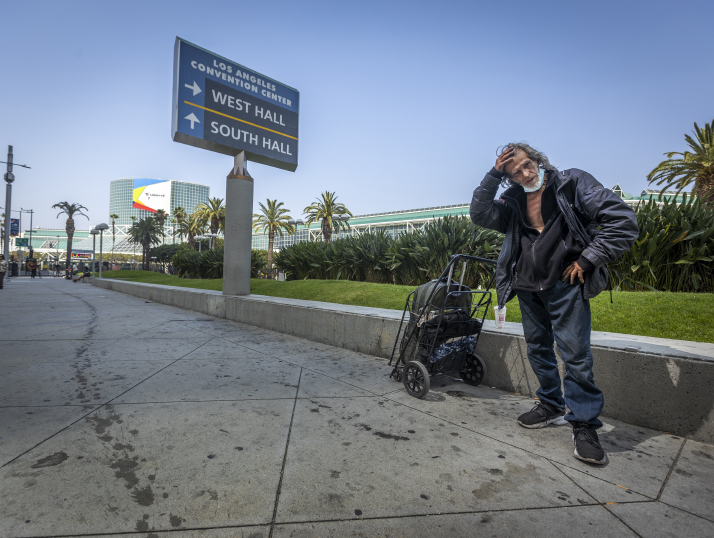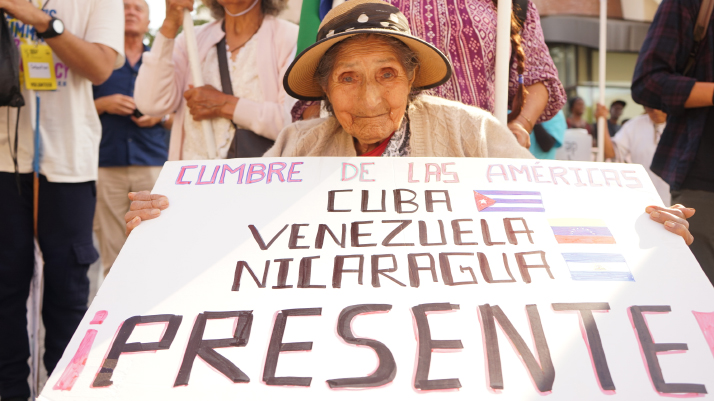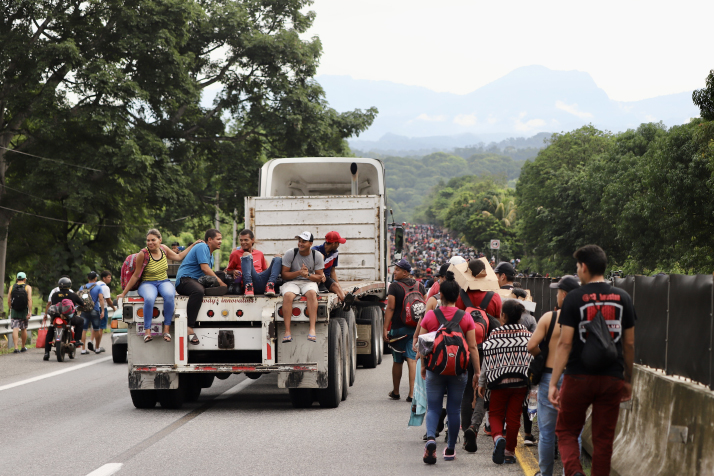| World |
| As its influence wanes, the U.S. alone cannot represent the Americas | |
|
|
 A man stands on the street on June 10 after his homeless encampment was removed due to the Summit of the Americas, which was held at the Los Angeles Convention Center, California, the U.S. (VISUAL PEOPLE)
The 16th President of the United States, Abraham Lincoln, once said, "A house divided against itself cannot stand." He was right. And so the recently concluded Summit of the Americas raises a good question: Can the house of the Americas stand firm given its growing cracks? In the lead-up to the meeting, which took place in Los Angeles, California, on June 6-10, the U.S. announced it would not be inviting Cuba, Nicaragua and Venezuela to the gathering due to these countries' human rights records. The move prompted the leaders of some Latin American and Caribbean (LAC) countries to either dispatch lower-level officials to attend or skip the meeting altogether. "Eight nations did not send a top-level official to the most important event we have hosted in the region in decades. This speaks volumes about how badly we've managed relations with our neighbors..." Brett Bruen, a former U.S. diplomat who served as director of global engagement under the Barack Obama administration, tweeted on June 8. The actual number was larger. Among them, leaders of Mexico, Guatemala, Honduras and El Salvador boycotted the meeting, Uruguay's president said he had contracted COVID-19, and Bolivia also declined to attend. "There is polarization [in the U.S.] due to economic problems and the situation generated by the COVID-19 pandemic... The United States has not yet recovered," said Roberto Zepeda, a researcher with the Center for Research on North America at the National Autonomous University of Mexico, adding that, like previous administrations, the current U.S. administration is looking abroad to divert attention. Despite Washington's efforts as a host, the summit showed the diminishing U.S. leadership in the region and how much progress remains to be made in areas such as integration and cooperation, Zepeda told Xinhua News Agency.  A woman protests against the U.S. refusal to invite the leaders from Cuba, Nicaragua and Venezuela to the U.S.-hosted Summit of the Americas, in Los Angeles, California, on June 10 (XINHUA)
Fading influence The First Summit of the Americas took place in 1994, with the subsequent ones being held every three or four years. The third summit, held in Canada in 2001, adopted the Inter-American Democratic Charter, which stipulates that only "democratic countries" are eligible to participate in the Organization of American States. Jiang Shixue, Director of the Center for Latin American Studies at Shanghai University, told Beijing Review that the emphasis on "ideology" and "common values" has long characterized the diplomatic strategies of successive U.S. presidents. "Nothing illustrates this better than Joe Biden's decision to not invite the three countries under the pretext of attendees having to meet U.S. standards of democracy. This practice is similar to the so-called 'Summit for Democracy' [on December 9-10, 2021]," Jiang said, adding that "democracy" is merely a tool for the U.S. to challenge any opposition at the Summit of the Americas and then turn it into the "Summit of America," a platform from which to lecture other countries. "I am not going to the summit because not all American countries are invited and I believe there is a need to change the policy that has been in place for centuries: the exclusion, the desire to dominate without reason, the disrespect for countries' sovereignty [and] the independence of each country," Mexican President Andrés Manuel López Obrador, a key Latin American leader on the gathering's invitee list, said at a news conference in Mexico City on June 6. "It shows the deep divisions across the continent," said Martha Bárcena, former Mexican Ambassador to the U.S. She pointed out that the leaders who decided against attending were "challenging U.S. influence, because [it] has been diminishing in the continent." Biden should prioritize dialogue rather than exclusion, and commonalities instead of arbitrary notions of difference, to keep the house of the Americas intact, according to David Castrillón-Kerrigan, a researcher and professor at the Universidad Externado de Colombia. "Should he fail to do so, the standing of the U.S. in the region will further weaken," he wrote in an article on China Daily. The U.S. wanted to use the summit as an opportunity to compensate for its inadequate attention to Latin America in recent years; however, "we are living in a multipolar world" in which the U.S. cannot act as it has in the past, not even in a region considered to be within its sphere of influence, Zepeda said. During the gathering, the U.S. proposed the Americas Partnership for Economic Prosperity, an economic recovery plan to be developed only with its most trusted partners which "distorts the continental character it purports," Luis Ricardo Delgado, a professor of social sciences at Venezuela's University of Carabobo, told Xinhua. The limited scope of the plan is a direct result of the fact that the U.S. "insists on injecting ideology into its international ties," he said. As a consequence, the summit "does not substantially modify the current status quo of international relations in the hemisphere," so its impact will be practically nil, he added.  A migrant caravan continues its trek to the U.S.-Mexico border, advancing along Mexico's southern Caribbean coast on June 7 (VISUAL PEOPLE)
Standing on their own As the first major diplomatic event targeting LAC countries since the Biden administration took office in early 2021, there was a significant division in expectations between the two sides from the very beginning. And the structural conflicts, of one trying to dominate the region with others trying to reject this, have become a true portrayal of this summit, said Zhang Jieyu, a researcher with the Department for Latin American and Caribbean Studies at the China Institute of International Studies (CIIS). Argentine President Alberto Fernández said at the summit that "the silence of those who are absent is calling to us" and insisted that the host country did not have the power to impose the "right of admission." "We definitely would have wished for a different Summit of the Americas," he added. Under the pressures of COVID-19 and the spillover effects of the Russia-Ukraine conflict, many LAC countries are facing severe challenges in economic recovery, inflation control, public health and poverty reduction, said Qian Feng, Director of the Research Department at the National Strategy Institute at Tsinghua University. What these countries were expecting was for the U.S. to offer more favorable market access, loans and aid to help them tide over difficulties. What they need now is real respect and equality. But "the U.S. merely cares about its own interests," Qian added. Washington's economic recovery proposal aims to mobilize new investments in the region, fortify supply chains, promote decarbonization and biodiversity, facilitate inclusive trade and update the "social contract" between governments and their people, U.S. political news outlet Politico reported, noting that these priorities are unlikely to satisfy the desire among LAC countries for more trade access to the U.S. "Donald Trump offered the Growth in the Americas initiative in 2019, then Biden touted his Build Back Better World plan and now it's this new economic package... But will those policies truly become effective? It remains to be seen," Jiang said. U.S. aid policies toward LAC countries have always proven discontinuous and it is highly doubtful the new initiative can be realized, according to Zhang of CIIS. The country has long pursued the "America First" approach in dealing with international affairs, giving short shrift to the interests of other countries in the region, she added. For example, last year, when people in LAC countries were in urgent need of vaccines amid the COVID-19 pandemic, the U.S. refused to share its vaccines, even though it had a surplus of stocks that were about to expire. "We are living in a different world... There are new institutions, new rules and that is what we are experiencing today," Mexican political scientist Eduardo Roldán told Xinhua. "The U.S. is going to have to understand that it has neglected Latin America and we are not its backyard. Latin America is giving itself respect." In 2011, 33 LAC countries announced the creation of the Community of Latin American and Caribbean States, which naturally excludes the U.S. and Canada, demonstrating the determination of those countries to stand on their own. (Print Edition Title: Summit of Discontent) Copyedited by Elsbeth van Paridon Comments to mamm@cicgamericas.com |
|
||||||||||||||||||||||||||||||
|